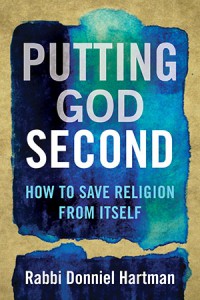A Liberal Rabbi Challenges Believers to “Put God Second”

Prominent Rabbi Donniel Hartman is the author of a seemingly contrary new book titled Putting God Second: How To Save Religion From Itself. A few minutes into his book talk at Brookings Institute on Tuesday, Hartman relayed his primary motivation for writing the intentionally provocative book: frustration with religion’s moral under-achievements.
Yes, he took it there.
The Rabbi soberly stated, “The fact that we are as bad as everybody else is not exactly a commercial for why to be committed to a religious tradition.” He then compared religions’ promotional message to that of McDonald’s, if the secular world was Burger King. He joked, “We’re no worse than them! Therefore, come join us.” The mainly religious audience laughed.
It didn’t take long before I realized this presentation wouldn’t be one of the more typical reinterpretations of orthodoxy to compete with the demands of modernity. Hartman, president of the Shalom Hartman Institute in Jerusalem, uses his faith as a framework for tackling the reasons why monotheistic religions have unsuccessfully produced societies that live up to their ethical ideals.
According to Hartman, religion suffers from an “autoimmune disease” that is responsible for the way the actions of religious practitioners undermine the very values they profess their religion provides. Hartman’s philosophy holds that there are two facets to this religious sickness: “god manipulation” and “god intoxication.”
God manipulation is what happens when the religious attempt to “control God” by justifying their desires and behavior as the “will of God.” From extremist groups like Westboro Baptist Church and Boko Haram claiming they’re doing their God’s bidding, to politicians like Scott Walker, Rick Perry, and Ben Carson declaring it was God’s plan for them to run for president despite utterly failing, these actions are usually self-serving and at the expense of excluding others.
The other critical flaw of religion is, according to Hartman, God intoxication, which he cites as the source of indifference that metastasizes in the mind of believers. This, he says, obstructs their ability to recognize ethical obligations that include respecting the humanity of those who aren’t a part of their religious tradition.
A lot of Hartman’s critique stems from a story involving the Jewish religious leader Hillel. According to this story, a gentile wishes to convert to Judaism and desires to be taught the entire Torah while standing on one foot. To this Hillel responds, “What is hateful to you, don’t do it to others. This is the whole Torah; the rest is commentary. Go and learn.” Hartman makes a point to say that Hillel could’ve easily recited scripture verbatim (Leviticus 19:18) but instead chose to rephrase it. He takes this to indicate scripture is meant to be as guidance rather than a rigid prescription.
While this can certainly be viewed as a novel liberal theology when it comes to providing a more humanist-oriented alternative to more insular and obstinate strains of religiosity, nonreligious skeptics will be less charmed by this yet decidedly religious perspective, because our core beliefs don’t hinge on reconciling supernatural claims incompatible with reality.
The irony of Hartman continuously stating “what God doesn’t want” by reinforcing his version of “what God really wants” wasn’t lost on me. Also, his religious education seemed to wane whenever the discussion departed from the monotheistic framework he’s fully invested in.
When Hartman appealed to Hillel’s teachings, his statements assumed the ethic of reciprocity (or “the Golden Rule”) originated with Hillel, despite its prior appearance in Egyptian antiquity as well as within Chinese philosophies like Confucianism. Additionally, when a Hindu audience member asked Hartman about whether his religious philosophy closely resembled the values taught by the Vedic tradition, Hartman admitted to not being familiar with Hinduism.
Whether he chooses to recognize it or not, his deeply held faith in God flavors his outlook which is ultimately little more than clever tinkering around the edges. Sure, this tinkering cuts deeper and is more creative, but it lacks an ability to truly divorce itself from a preoccupation with what he imagines to be God’s will. And when that’s your aim, though it is more considerate and charitable, it results in yet another addition to the annals of religion trying to remain hip.
Hartman should be commended for stating that believers simply cannot ignore religious text that directs them to participate in harmful actions. Still, his vision for a “happy medium” between the temptations of God manipulation and God intoxication falls short. Instead of suggesting we acknowledge the limitation of scripture and overrule passages incompatible with modernity through compassion for others, he should take it one step further and outright admit what some of his remarks could easily be interpreted as implying: We can be good without believing in a god.
